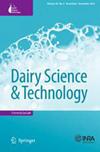Production Responses of Holstein Dairy Cows to a Sodium Propionate Supplement Fed Postpartum to Prevent Hyperketonemia
Q2 Agricultural and Biological Sciences
引用次数: 0
Abstract
Hyperketonemia is common in cows postpartum and is associated with a decrease in milk production, reproductive efficiency, and increased risk of periparturient diseases and early culling from the herd. The objective of this research was to determine if feeding an exogenous source of propionate increased milk and milk component yield and reduced the incidence of hyperketonemia and other health events in Holstein dairy cows. Cows were systematically enrolled in the control group (C) or sodium propionate treatment group (SP) in a randomized block design. A subset of cows was sampled for blood glucose and betahydroxybutyrate (BHB) concentrations in milk at 3, 7, and 14 days using a NovaMax® Plus™ meter (Nova Diabetes Care, Inc., Billerica, MA, USA). Data were analyzed using a mixed model. Average blood BHB and glucose concentrations during the postpartum period did not differ between treatments for multiparous or primiparous cows (C = 0.53 ± 0.02, SP: 0.55 ± 0.02 mmol BHB/L, p = 0.5; C = 44.0 ± 0.77, SP = 43.0 ± 0.78 glucose mg/dL, p = 0.6). However, the prevalence of hyperketonemia and metritis was high in primiparous cows (C = 35.6% and 19.8%, respectively; SP = 35.8% and 18.9%, respectively). Blood glucose was inversely related to BHB concentration for cows below 40 mg/dL blood glucose. Feeding sodium propionate during the postpartum period increased milk fat yield (C = 1.71; SP = 1.86 kg/day, p = 0.01), tended to increase milk yield in multiparous cows (C = 39.3; SP = 40.5 kg/day, p = 0.06) and increased milk fat yield in primiparous cows (C = 1.18; SP = 1.27 kg/day, p = 0.02). Including sodium propionate in the total mixed ration is beneficial to reduce health events and increase milk fat production in multiparous cows but may only increase milk fat production in primiparous cows.产后补饲丙酸钠预防高酮血症对荷斯坦奶牛产量的影响
高酮血症在奶牛产后很常见,与产奶量下降、繁殖效率下降、围产期疾病风险增加和奶牛早期被淘汰有关。本研究的目的是确定外源丙酸是否能提高荷斯坦奶牛的产奶量和乳成分产量,并降低高酮血症和其他健康事件的发生率。采用随机区组设计,将奶牛系统分为对照组(C)和丙酸钠处理组(SP)。使用NovaMax®Plus™计量仪(Nova Diabetes Care, Inc., Billerica, MA, USA)在第3、7和14天对一部分奶牛进行血糖和牛奶中β -羟基丁酸盐(BHB)浓度的采样。数据分析采用混合模型。产牛和初产牛产后平均血BHB和葡萄糖浓度在不同处理之间无差异(C = 0.53±0.02,SP: 0.55±0.02 mmol BHB/L, p = 0.5;C = 44.0±0.77,SP = 43.0±0.78葡萄糖mg/dL, p = 0.6)。然而,高酮血症和子宫炎的患病率在初产奶牛中较高(C分别为35.6%和19.8%;SP = 35.8%和18.9%)。当奶牛血糖低于40 mg/dL时,血糖与BHB浓度呈负相关。产后喂养丙酸钠可提高乳脂产量(C = 1.71;SP = 1.86 kg/d, p = 0.01),有提高产奶量的趋势(C = 39.3;SP = 40.5 kg/day, p = 0.06),提高了奶牛的乳脂产量(C = 1.18;SP = 1.27 kg/day, p = 0.02)。在总混合日粮中添加丙酸钠有利于减少多胎奶牛的健康事件和提高乳脂产量,但可能只会增加初产奶牛的乳脂产量。
本文章由计算机程序翻译,如有差异,请以英文原文为准。
求助全文
约1分钟内获得全文
求助全文
来源期刊

Dairy Science & Technology
农林科学-食品科技
CiteScore
2.30
自引率
0.00%
发文量
0
审稿时长
2 months
期刊介绍:
Information not localized
 求助内容:
求助内容: 应助结果提醒方式:
应助结果提醒方式:


